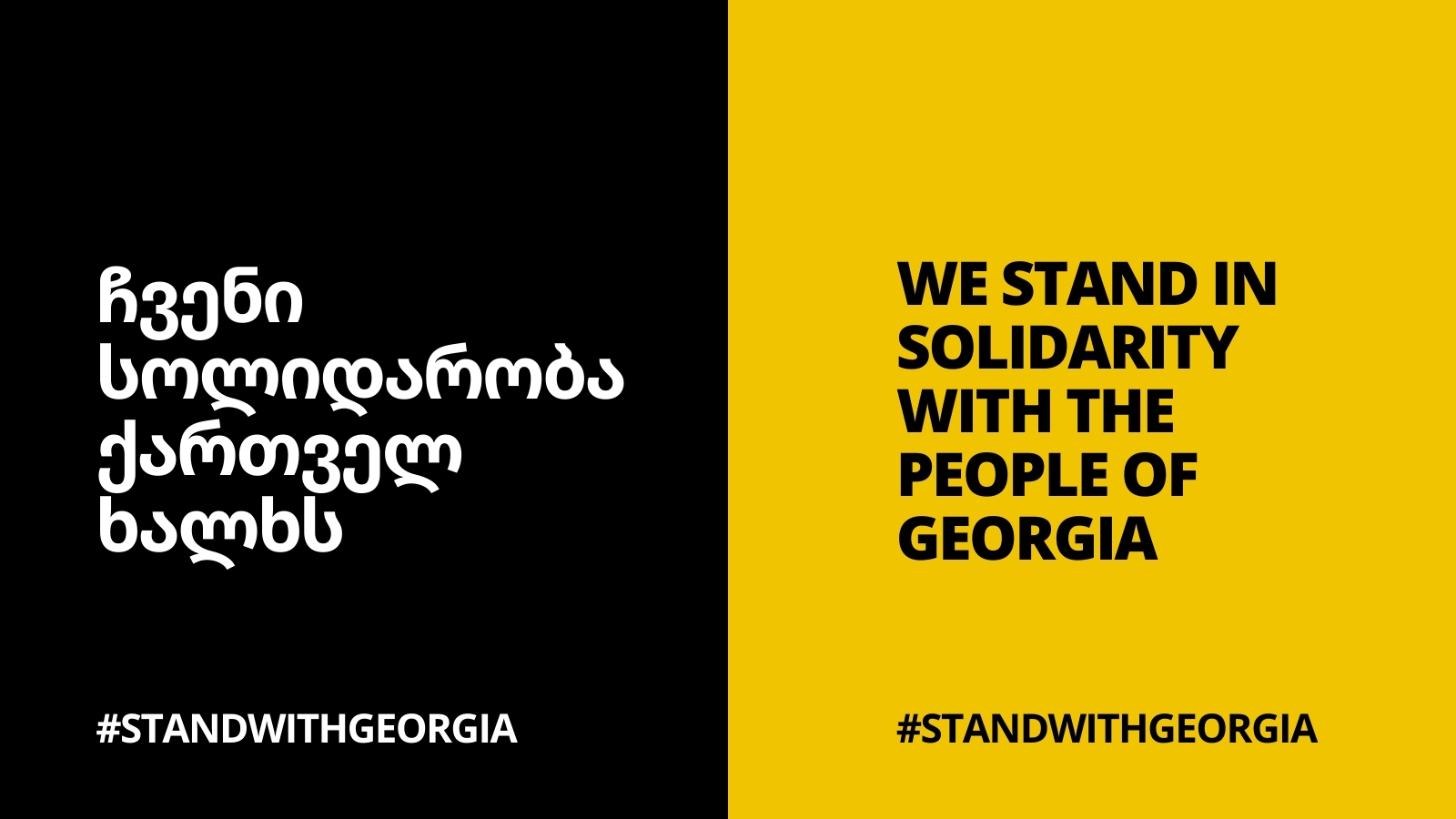
Network Statement on Attacks against HRHT in Georgia
We, the undersigned members of the Network of Human Rights Houses urge the government of Georgia to immediately end the ongoing repressions against independent voices. We condemn the use of illegal and disproportionate force against largely peaceful protestors, physical attacks against civil society representatives, alleged illegal detention of a well-known blogger, coordinated campaign of smear, harassment and intimidation against journalists, human rights defenders and their family members, including children.
We urge the Georgian authorities to immediately stop the persecution of independent voices, bring perpetrators to justice, respect civic space, publicly condemn violence and withdraw the “foreign agent” draft law that – even before its adoption – has created the oppressive environment we have warned about and are now witnessing in Georgia.
Since parliamentary hearings on the Government-proposed “foreign agent” law began in mid-April 2024, mass protests have engulfed Georgia. The law enforcement responded with illegal and largely disproportionate force against mostly peaceful protestors, using teargas, stun grenades, pepper spray and water cannons. Contrary to the requirements of international law, some law enforcement groups engaged in violence were entirely unidentifiable. There are documented cases of likely illegal use of rubber bullets and beatings, allegedly amounting to ill-treatment and torture. According to the data from the United Legal Assistance Network of the civil society, at least 138 peaceful protestors were detained during protest actions. At least 20 media workers were physically assaulted, verbally harassed, or detained. Six people were arrested for assaulting a police officer and damaging property.
Local human rights groups report that on the night of 9 May 2024 the police hindered the exercise of freedom of assembly and used “violent methods” to detain participants of a peaceful march on Chavchavadze Avenue in central Tbilisi. Lela Tsiskarishvili, the Chairperson of Human Rights House Tbilisi and Executive Director of the Georgian Centre for Psychosocial and Medical Rehabilitation of Torture Victims – GCRT was affected too.
On 5 – 9 May 2024, a widely respected school teacher and his son, a human rights defender, journalists, a protest organiser, a former diplomat and at least four political activists were brutally attacked outside of their homes or on the street by unidentified plain-clothed assailants. Some of the attackers were caught on camera. The police criminally charged one individual, however, in other instances no accountability ensued so far. This practise of connected instances of violence by plain-clothed attackers is reminiscent of method known as “Titushky” and used by Ukraine’s then-repressive regime against activists in 2013-2014, condemned by the European Court of Human Rights.
On 7 May 2024, the Speaker of the Parliament announced the decision by Political Council of the Georgian Dream party to create an online public database of government critics, for the state and public to “respond” to them. Subsequent events, particularly, the targeting of homes and offices of civic actors seems to be an immediate consequence of this decision.
Since 7 May 2024, human rights defenders, activists, protest participants, their family members, including under-age children (amongst others, the children of HRH Tbilisi Chairperson), have been receiving menacing phone calls. The callers have insulted them for going to protests, threatened their physical integrity and made it clear that they know the home addresses of their targets.
On 9 and 10 May 2024, the civil society and media representatives, including Human Rights House Tbilisi and its NGO members, woke up to their homes, offices, and cars being vandalised by identical propaganda posters and graffiti insulting them and their legitimate work. The spirit of the graffiti writings used in Georgia is similar to the inscriptions on the office of Russia’s biggest human rights organisation in Moscow within the context of the Russian foreign agent law adoption, signalling a new era of oppression.
On 9 May 2024 the police surrounded and searched the home of a popular military blogger and a “foreign agent” law opponent Ucha Abashidze. Contrary to the requirements of the Georgian legislation, the police did not allow his lawyer to participate in the search. Abashidze was detained for the alleged illegal possession of firearms, while his lawyers and human rights defenders maintain that what police seized are simulation pistols used for the Airsoft game and two legally registered and owned firearms. Abashidze is reportedly the President of the Georgian Airsoft Association.
Georgian authorities are at odds with their human rights commitments to uphold and protect freedoms of assembly and expression, to respect the right to safety and security and protect the right to privacy enshrined in the European Convention on Human Rights and the International Covenant on Civil and Political Rights.
We call on the Georgian authorities to:
-
Immediately stop the persecution of independent voices and discontinue the campaign of intimidation against human rights defenders, journalists and broader civil society;
-
Withdraw the draft “foreign agent” law;
-
Publicly condemn violence and ensure respect for civic space;
-
Promptly bring those responsible for the use of illegal or excessive force and violence, for threatening civic actors and vandalising their homes and offices, to justice, in accordance with the criminal and administrative law requirements;
-
Review the legality of detention of the blogger Ucha Abashidze and safeguard his rights, including the right to liberty and security.
We call on the European Union, Council of Europe institutions and the United Nations bodies, as well as the like-minded states internationally, including their Embassies in Tbilisi to:
-
Condemn in the strongest possible terms the ongoing campaign and repressions against independent and critical voices in Georgia;
-
Leverage all legal and diplomatic means available to them to advocate for the immediate withdrawal of the “foreign agent” law draft.
